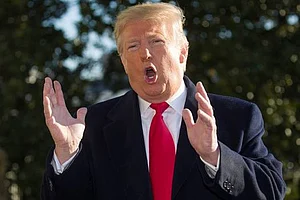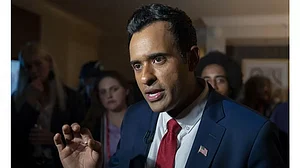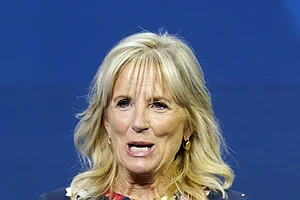
Name: Nikki Haley
Nikki Haley's political career has been marked by several significant achievements and milestones. Haley rose through the ranks of state politics to become the first female and first Indian-American governor of South Carolina in 2011. Her tenure as governor was notable for her response to the 2015 Charleston church shooting and her efforts on economic development and education reform.
In 2017, Haley transitioned to the national stage when she was appointed as the U.S. Ambassador to the United Nations under the Trump administration. In this role, she gained prominence for her advocacy for Israel and her involvement in key international issues. After leaving her position at the UN in 2018, Haley maintained a presence in national politics, eventually launching a campaign for the 2024 Republican presidential nomination.
Throughout her career, Haley has been known for her conservative stance on issues such as taxation, immigration, and abortion. She has also been recognized as a trailblazer for women and minorities in politics. Despite facing challenges and controversies, including ethics fines and political feuds, Haley has remained a significant figure in the Republican Party. Her presidential campaign, though ultimately unsuccessful, made history when she became the first woman to win a Republican presidential primary contest in Washington, D.C. in 2024. Haley's journey from state legislator to governor, UN ambassador, and presidential candidate reflects her ambition and her impact on American politics.
During her tenure as governor of South Carolina from 2011 to 2017, Nikki Haley pursued several significant policy initiatives and faced pivotal moments in state politics. She prioritized economic growth, highlighting South Carolina's low unemployment rate and appealing business conditions. Initially supportive of the Confederate flag's presence at the statehouse, she later called for its removal following the Charleston church shooting in June 2015, emphasizing inclusivity and the need to avoid causing pain.
Haley also navigated contentious legislative issues, notably rejecting a proposed "bathroom bill" targeting transgender individuals in 2016, arguing it addressed no real problem. She supported voter photo ID laws and signed anti-BDS legislation, reflecting her strong stance on Israel and criticism of the United Nations' approach towards the country.
In her role as U.S. ambassador to the United Nations from 2017 to 2018, Haley continued to advocate for Israel, opposed the Iran nuclear deal withdrawal, and defended the U.S. withdrawal from the Paris climate agreement. She was vocal on international issues, condemning Russian actions in Crimea and Syria, and criticizing Iran's regional influence and alleged violations. Haley also played a key role in U.S. policy towards North Korea, advocating for stringent sanctions and military readiness in response to missile tests.
Throughout her career, Nikki Haley has been known for her assertive policy stances, advocacy for conservative values, and a diplomatic approach on the international stage, leaving a significant impact both within her home state and on U.S. foreign policy.
After her tenure as U.S. ambassador to the United Nations concluded in December 2018, Nikki Haley remained influential in conservative circles and continued to engage in political and advocacy work. She played a pivotal role during her time at the UN, notably advocating for Israel and opposing resolutions she perceived as biased against the country. Haley supported the controversial decision to move the U.S. embassy in Israel to Jerusalem, a move criticized by many nations at the UN. She also blocked the appointment of a Palestinian envoy to Libya and criticized UNESCO's decisions regarding Palestinian territorial claims.
Following her resignation, Haley maintained a high profile, founding the advocacy group Stand for America and joining the board of Boeing before resigning over a disagreement on federal bailout funds during the COVID-19 pandemic. She remained a staunch supporter of Donald Trump, defending his policies and criticizing his impeachment proceedings. Haley's political ambitions continued to be evident through her endorsements of Republican candidates and her active involvement in conservative causes, preparing for potential future political roles.
Nikki Haley's political career has been marked by her complex relationship with Donald Trump and her evolving stance on various issues. During the 2016 Republican presidential primaries, Haley initially supported Marco Rubio and later Ted Cruz. She was critical of Trump's rhetoric, warning that it could lead to violence. However, she ultimately voted for Trump and endorsed him as the best candidate based on policies.
After Trump's election, Haley was appointed as U.S. ambassador to the United Nations, a position she held from January 2017 to December 2018. Following her resignation, she remained supportive of the Trump administration, calling Trump a friend and expressing pride in the administration's successes. Her stance on Trump began to shift after the 2020 election and the events of January 6, 2021. While she initially opposed Trump's second impeachment, she later acknowledged that he had "let us down" and criticized his actions during the Capitol riot.
In February 2023, Haley announced her candidacy for the 2024 Republican presidential nomination, becoming the second major candidate to enter the race after Trump. Her campaign marked a historic moment as she became the first woman of color to contend for the Republican presidential nomination. Despite facing an uphill battle against Trump and DeSantis, Haley managed to secure several notable endorsements and showed some momentum in polls, particularly in New Hampshire.
Haley's campaign performance included a third-place finish in the Iowa caucuses and a second-place finish in the New Hampshire primary. She won her first primary in the District of Columbia on March 2, 2024, and the Vermont primary on Super Tuesday. However, facing overwhelming odds against Trump's dominance in the primaries, Haley suspended her campaign on March 6, 2024.
Throughout her campaign, Haley took positions on various issues that sometimes aligned with and sometimes diverged from traditional Republican stances. On social issues, she supported a 15-week national abortion ban with exceptions, advocated for extending Florida's "Don't Say Gay" law, and signed a pledge affirming that only women can be pregnant. She proposed a TikTok ban, citing national security concerns.
Regarding fiscal policy, Haley indicated willingness to make significant budget cuts, including to Medicare and Social Security. She supported raising the retirement age for future beneficiaries and means-testing these programs. On foreign policy, Haley took a hawkish stance, vowing to cut foreign aid to countries she deemed "enemies" of the United States and rejecting calls for a ceasefire in the Israel-Hamas war.
Haley's campaign strategy involved attempting to appeal to both traditional Reaganite Republicans and Trump supporters. She often criticized Trump implicitly while avoiding direct confrontations. She stated she would be inclined to pardon Trump if elected, despite criticizing some of his actions.
After suspending her campaign, Haley joined the Hudson Institute, a conservative think tank. Despite no longer being an active candidate, she continued to receive votes in Republican primaries. In May 2024, Haley stated she would vote for Trump in the general election, effectively endorsing him despite their past differences.
Throughout her career, Haley has faced criticism for her changing positions on various issues and her relationship with Trump. Her campaign highlighted both the progress made in Republican politics regarding diversity and the ongoing challenges faced by candidates attempting to chart a course between traditional conservatism and Trump's influence on the party.

























